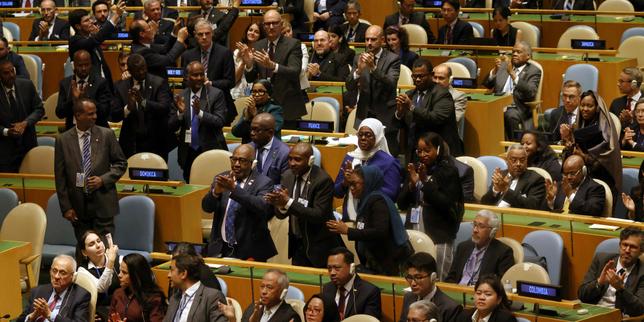France's Recognition of Palestine Sparks Mixed Political Reactions
France's recognition of Palestine has resulted in varied political responses from across the spectrum.
- • Emmanuel Macron announced France's recognition of Palestine.
- • Mixed reactions include support from left-wing parties and criticism from right-wing factions.
- • Recognition follows recent conflicts in Gaza, reflecting a shift in international attitudes.
- • Currently, 39 countries, including the US and Israel, do not recognize Palestine.
Key details
France's official recognition of the State of Palestine, announced by President Emmanuel Macron on September 22, 2025, has elicited a spectrum of political responses within the country and across Europe. Joining a list of over 150 UN members, France's recognition aligns with a broader European trend, with countries like Belgium, Luxembourg, and Malta also confirming their support.
Fabien Roussel, the national secretary of France's Communist Party (PCF), celebrated the announcement as a 'delayed victory' for the popular struggle for Palestinian self-determination. Roussel underscored the significance of this recognition as an irreversible victory for the Palestinian people. Similarly, Jean-Luc Mélenchon, the leader of the far-left party, La France insoumise (LFI), asserted that recognizing Palestine bolsters efforts to isolate aggressors like Israel and advocated for sanctions against the Israeli state due to its actions in Gaza. Olivier Faure, the first secretary of the Socialist Party, called September 22 a historic day for France, highlighting the importance of the recognition in the broader context of international justice and peace.
However, the decision faced stern backlash from right-wing figures and parties. Bruno Retailleau, the interior minister and president of the Republicans (LR), criticized the move for being unconditional, arguing it could undermine peace efforts and suggested it relates to a ‘victory for Hamas’. Marine Le Pen, leader of the National Rally (RN), echoed these sentiments, deriding the recognition and characterizing it as an acknowledgment of a 'Hamastan', rather than a legitimate state.
The recognition comes amidst increased international scrutiny following recent conflicts in Gaza, prompting several nations to reconsider their stances. Legal experts note that state recognition is often seen as symbolic in international law, but it nonetheless influences diplomatic relations. Historically, Algeria was the first country to recognize Palestine shortly after its declaration in 1988, and while many nations support the cause, approximately 39 countries, including the United States and Israel, still oppose Palestinian statehood. This backdrop illustrates the complex interplay of support and resistance within the ongoing struggle for Palestinian rights.
This article was translated and synthesized from French sources, providing English-speaking readers with local perspectives.
Source articles (2)
Source comparison
Date of France's recognition of Palestine
lefigaro.fr
"Emmanuel Macron announced France's recognition of the State of Palestine on Monday."
lemonde.fr
"September 22 is declared a historic day for France, celebrating the recognition of Palestine."
Latest news
France Returns the Djidji Ayôkwé Talking Drum to Côte d'Ivoire After Over a Century
Record 37 Days of Rain Triggers Ongoing Severe Flooding in Western France
Political Divisions and Social Tensions Intensify Following Quentin Deranque’s Death in Lyon
French Economy Minister Calls for Full Insurance Industry Mobilization Amid Devastating Storm Floods
France Boosts Social and Solidarity Economy with New Tools and Potential Tax Reforms in 2026
Saint-Nazaire Mayor Condemns Vandalism of Two Political Offices as Attack on Democracy
The top news stories in France
Delivered straight to your inbox each morning.


